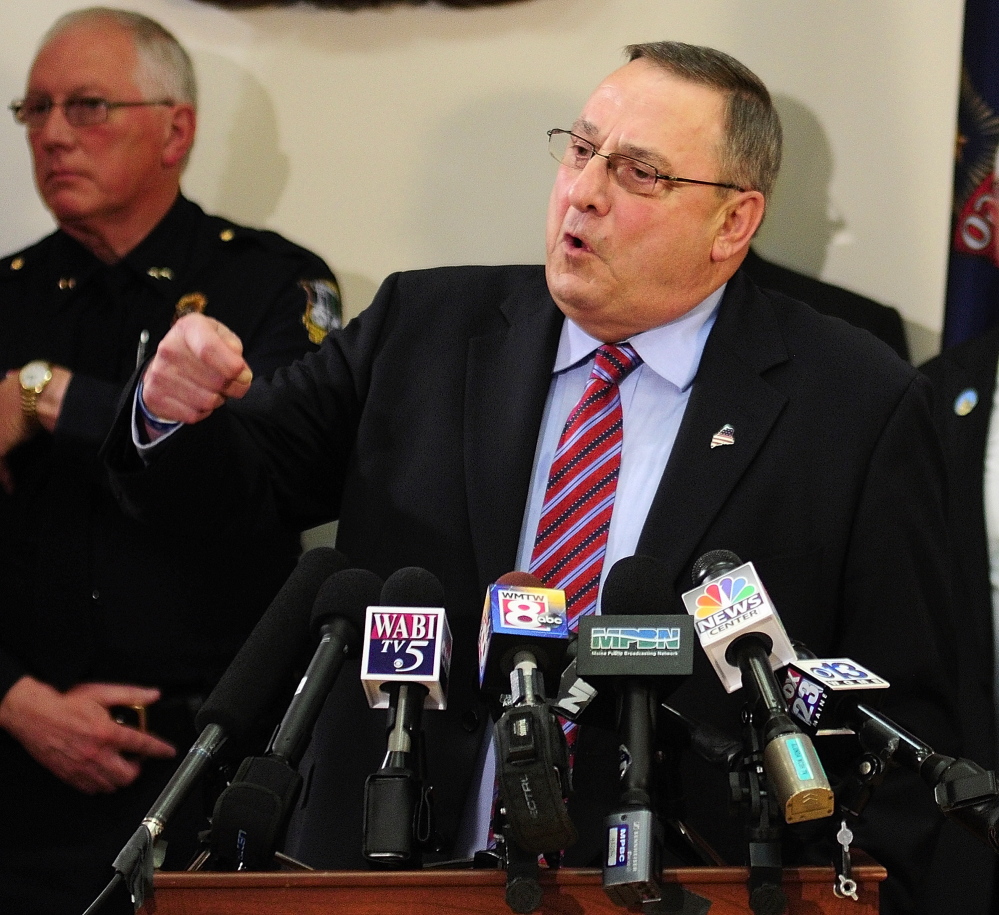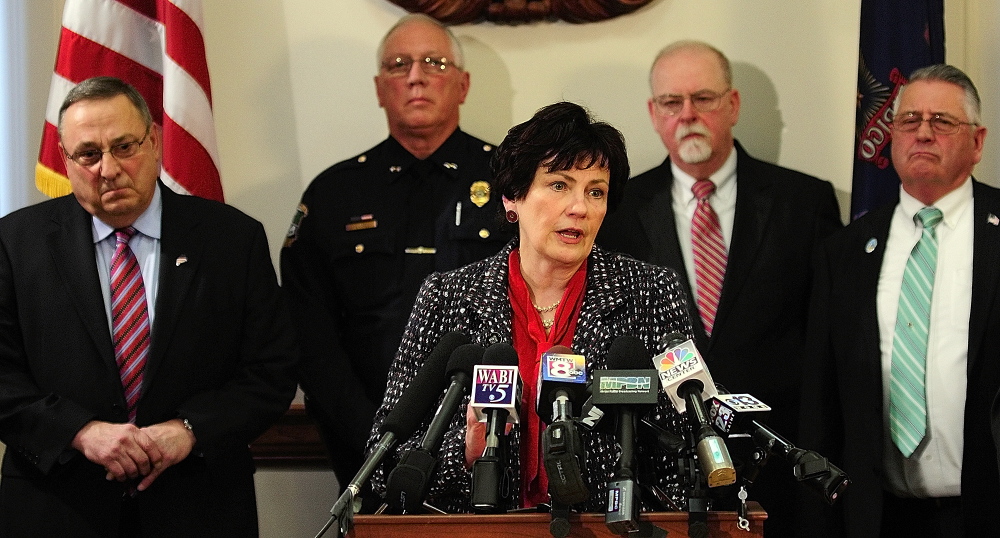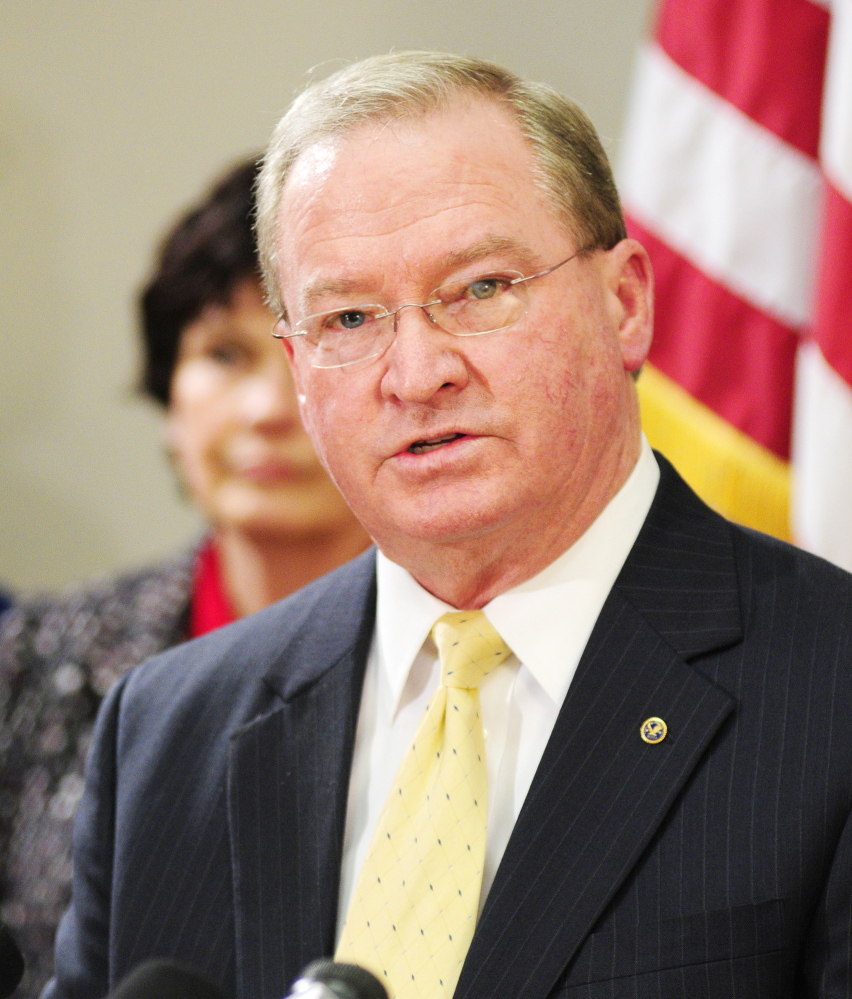AUGUSTA — Flanked by state and county law enforcement officials and Democratic Attorney General Janet Mills, Republican Gov. Paul LePage released his plan Tuesday to bolster Maine’s efforts in what he called its failed war against drugs.
The governor’s proposal focuses almost solely on enforcement and prosecution, calling for more than $2 million in new spending for 14 agents in the Maine Drug Enforcement Agency, four judges to preside over cases in the state drug court, and four assistant attorneys general dedicated to prosecution of drug crimes.
LePage responded to critics who have said his bill ignores the dire need for more spending on treatment and prevention, saying both are important, but stopping short of promising initiatives to address either need this year.
The governor pitched his bill as a tool against drug trafficking, not drug use.
“We are truly losing the war on drugs on the streets,” he said. “This is causing an increased threat to public safety and most certainly to the health of Mainers.”
He later said, “We must hunt down the dealers and get them off the streets.”
The governor, along with Roy McKinney, director of the Maine Drug Enforcement Agency, said the bill would bring the agency’s staffing closer to the level it was at more than a decade ago.
The agency now has 40 full-time employees assigned to drug cases, said McKinney. It had close to 100 sworn agents and employees in 1992, when the Legislature and Republican Gov. John McKernan created the MDEA.
“No area of Maine is immune from drug trafficking and its impact,” McKinney said.
“Both the volume and the complexity of investigating drug crime has increased,” he said. “Maine is subject to ever-increasing numbers of out-of-state drug trafficking organizations establishing drug markets in the state. And they’re also involved in other criminal activity, including human trafficking.”
McKernan’s initiative in 1992 coincided with the national war on drugs and drew funding from a grant program in the U.S. Department of Justice. Federal funding has diminished over the years, as state and federal policymakers have shifted their emphasis from prosecution to prevention and treatment. The shift reflects research findings that harsher penalties for drug offenses have increased the cost of jailing offenders without reducing rates of drug use.
States have since adjusted their corrections and sentencing policies. In 2012, the National Conference of State Legislatures found that 24 states had changed their penalties for drug crimes, and more than half of them reduced penalties to divert low-level offenders from prison in favor of community supervision and treatment.
At the same time, many states are increasing penalties for drug trafficking, a path that LePage said he is willing to explore. When asked if he is worried about the capacity of the state’s correctional facilities, he said, “If we fill our jails and we still have more (drug traffickers), we’ll talk to other states about housing them for us.”
REPEATING A DRUG WAR FAILURE?
LePage’s bill, L.D. 1811, was criticized by his political opponents and civil liberties advocates.
The American Civil Liberties Union of Maine said the bill is misguided, noting that drug arrests have increased by nearly 240 percent since the mid-1980s while “abuse has skyrocketed.” The ACLU cited a report from the Attorney General’s Office that 163 drug-related deaths occurred in Maine in 2012, more than the number of deaths caused by car accidents.
Grainne Dunne, justice organizer for the ACLU of Maine, said in a prepared statement that the governor is repeating the failure of the drug war.
“Governor LePage himself has said that the war on drugs is a failure, yet he is proposing a continuation of those same failed policies that have wreaked havoc on our communities and our state budgets,” Dunne said. “The war on drugs is one of the most costly, most wasteful, and least effective government programs ever devised. Lawmakers across the country are taking a smarter approach to the rise in drug abuse, and Maine should do the same.”
Rep. Mark Dion, D-Portland, a former sheriff in Cumberland County, said the governor’s approach is outdated.
“I have no dispute with the governor’s plan to increase law enforcement resources,” he said. “But without resources to intervene and help people control their addictions, no number of drug agents or prison cells will be able to stem the tide.”
Attorney General Mills, whose office will get four more drug prosecutors if L.D. 1811 is passed, has said that she supports increased enforcement. However, she said treatment and prevention should be part of the solution.
FUNDING FALLS AS MORE TREATED
A report last month by the Maine Sunday Telegram showed that the number of people seeking treatment for opiate abuse has more than doubled in the past decade, to about 4,800 in 2013. In the last three years alone, demand for treatment has increased 15 percent. The number seeking treatment for heroin abuse has doubled since 2010, to 1,820.
In 2010, Maine spent $47 million on substance abuse treatment ranging from sober-living situations such as halfway houses, to outpatient counseling, to hospitals or short-term stays in rehabilitation clinics. Last year, the amount dropped by 7 percent, to $43.7 million. The state’s share of a federal grant for treatment and prevention also decreased in that period, from $6.7 million to $6.3 million.
LePage didn’t directly answer questions Tuesday about whether he feels the state is adequately funding treatment and prevention programs. He said more policy initiatives will come from the Department of Health and Human Services, but he declined to say whether that will happen during the current legislative session.
LePage did say that he supports a proposal before the Legislature’s budget-writing committee to reduce the time that MaineCare recipients can receive reimbursements for suboxone and methadone treatments for drug addiction, from two years to six months.
In January, the state imposed a two-year limit on MaineCare payments to people who are being treated for opiate addiction with suboxone and methadone, with certain exceptions. About 12,000 Mainers had suboxone prescriptions in 2010, according to the DHHS, and many of them were MaineCare recipients.
LePage said he opposes a bill that would allow family members or caretakers of drug addicts to get prescriptions for naloxone, an anti-overdose drug. He said he supports the drug when administered by medical professionals, but not parents of addicts.
“It’s an escape. It’s an excuse to stay addicted,” he said.
Steve Mistler can be contacted at 791-6345 or at:
smistler@pressherald.com
Twitter: @stevemistler
Send questions/comments to the editors.






Comments are no longer available on this story